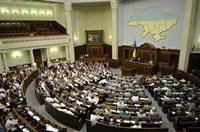
Impact of the new version of the Budget Code of Ukraine on public finance
On 23 June 2009, the Verkhovna Rada of
As the result of IBSER’s proactive and professional efforts in this area, the Law has incorporated about 80 provisions developed by Institute’s experts and essential for strengthening the financial resources of local self-government, decentralization, transparency, and predictability of public finance, implementation of PPB and medium-term budgeting.
These provisions would allow nearly tripling the own-source revenues of local budgets, provide a stable source of financing for local housing and communal services sector development programs, energize the market of municipal borrowing, and launch an active dialog on public-private partnerships in the budgetary sphere.
Thus, among other things, as part of improving the budget process transparency and efficiency, the new Budget Code version stipulates that the Performance Program Budgeting (PPB) method shall be used both at the national and local levels, provides the definitions of key PPB terms, defines the rules and procedures for the formulation of budget programs, and approves the use of performance indicators for evaluating the budget expenditures. These measures would allow using funds in a more efficient manner, and make it possible to monitor the actual results, which could be achieved through budget spending.
In addition, the new Budget Code version would have an impact on increasing the level of fiscal decentralization and expand the range of tax resources used for local revenue generation.
The main problem of budget expenditures is that they are disconnected from the criteria of the quality of public services provided to the population using budget funds. Therefore, the provision regarding the establishment of requirements for calculation of transfers using the State social standards and norms is extremely important. However, in order to gain real benefits from this provision, the Government will have to step up efforts of its ministries and departments towards developing such standards, which should not only reflect the quantitative characteristics of a social service, but also take into account its quality and accessibility for the population.
The provision regarding direct intergovernmental budgetary relations and formula-based calculations between the State budget and nearly 12,000 budgets of villages, settlements, and rayon-significance cities does not change the financial capacity of basic budgets per se. Indeed, according to the old Budget Code version, it was the rayon level of government, which implemented the same formula-based calculations approved by a Cabinet decree. Therefore, any growth of financial resources at the village level will occur thanks to a significant increase in the share of personal income tax. The basic-level budgets will get 65% of this tax collected in the respective jurisdictions against 25% according to the existing Budget Code version. Notably, 15% of this tax are targeted specifically for use by the development budgets.
Besides the PIT revenues, the development budget also includes other types of revenues (fee for provision of local guarantees, 10% of the enterprise profit tax, 15% of the fixed tax on income from entrepreneurial activity etc.). Broadening of the development budget revenue base would facilitate implementation of important projects aimed at development of the regions.
The proposed Budget Code version, however, contains a number of provisions, which restrict the rights of local government to manage budgets and have inherent risks regarding efficient budgeting at the local level. For example, the code stipulates the requirement for local governments' to set expenditures for delegated functions at a level not below the Ministry of Finance estimates. In reality, this means that the Ministry of Finance estimates would acquire the status of obligatory planned indicators, which violates the rights of local government for independent budget formulation and management, creates the risks of unbalancing individual local budgets in case of inadequate calculations made at the central level (it is quite difficult to make realistic estimates for each area of budget revenues and expenditures for over 12,000 local budgets from the center, with accounting for special conditions of each individual community being clearly impossible). Besides, this provision distorts the incentives for local governments striving to optimize the network or staff of budgetary institutions, since were they to reduce both, they would not be able to reduce their expenditure plan on the same timescale.
Regarding the local borrowing, it should be noted that the new Code version retains the provision with regard to the Ministry of Finance having to approve the terms and conditions of local borrowing, which on many experts’ opinions (1) was one of the deficiencies in the existing system due to an unclear procedure for providing justifications of local budget’s financial capacity.
However, despite certain shortcoming, on the whole, adoption of the new version of the Budget code of
The overwhelming majority of the proposed provisions would promote further economic growth and stimulate structural reforms in the budgetary sphere.
1. All the materials of the Round Table discussion on “Partnership between banks and local governments as one of the ways to overcome the economic crisis”, organized by IBSER on 16 April in Kyiv, can be found in “News and Events” section of IBSER web-site.
2. The full version of the presentation on “Impact of the new version of the Budget Code of Ukraine on public finance” can be found in “Research and Materials” / “Legislation Analysis” section of IBSER web-site.

 Glyanec
Glyanec